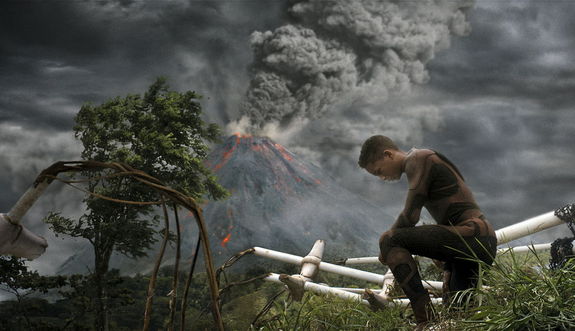Five Weird Future Predictions in 'After Earth'

Humans aren't the luckiest creatures in "After Earth," a new science fiction movie that hit theaters around the United States today (May 31).
Actor Will Smith and his son Jaden Smith star as two future humans that crash-land on Earth 1,000 years after humans abandoned the planet for greener pastures. Jaden's character Kitai is forced to fight and run his way across the now alien Earth to save the life of his injured father who remains on the ship.

"After Earth" presents an incredibly bleak future for humans as a space-traveling species. Here are five strange aspects of humanity's future on and off our home planet as presented by the minds behind "After Earth." [See Photos from "After Earth"]
Warning: Spoilers ahead.
Humans don't live on Earth anymore
In the movie, humans have deserted Earth to live on the planet Nova Prime, a world seemingly within our galaxy but outside of the solar system.
People have created advanced, manta ray-shaped spaceships that are able to traverse interstellar distances. When Kitai and his dad Cypher crash-landed on Earth, they were heading to a different planet, far from Nova Prime and Earth. The propulsion system used in the movie is not explained, but it's definitely far beyond anything we have at our disposal today.
Get the Space.com Newsletter
Breaking space news, the latest updates on rocket launches, skywatching events and more!
We can't breathe on Earth
At a certain point in the history presented by "After Earth," humans were forced to leave the planet because it basically kicked us out. The Earth began remaking itself into a hostile place for humans to live while still leaving all other oxygen-breathing animals unscathed.
As Kitai runs to find help on the now pristine surface of Earth, he has to take doses of an inhaler that allows him to breathe the air on the forbidden planet. At one point a parasite poisons the young man, and a group of angry baboon-like mammals chase him through a jungle.
Although humans have been off Earth for 1,000 years, it still doesn't seem to like us very much.
A computer is your doctor
As Cypher sits on the ship, coaching his son through the dangers before him on Earth, he is also trying his best to heal his broken legs.
The decorated general in a United Nations space peacekeeping group performs a bypass on himself, without anesthesia, at the urging of a computer program designed to diagnose and possibly heal an injured person on a long-duration mission. Technology aside, whether any future humans will have the stomach to perform surgery on themselves is an open question.
Aliens exist, and they're mean
When humans got to Nova Prime, they also make first contact with a group of aliens that already inhabit the planet. The advanced life forms were hostile and created monsters that smell human fear to seek and destroy all people on their planet.
Ursas (the monsters) are blind, but they can smell and track the pheromones the human body expels when frightened. Whether such an ability could ever be developed in real-life remains to be seen.

The spaceship that crash-landed on Earth was also carrying an Ursa along with its other human cargo. The monster miraculously survives the accident, can breathe the air on Earth and is prowling the crash site looking for human prey. Kitai needs to overcome his fear to hopefully survive and defeat the alien horror.
We wear suits that sense danger
Our clothes are much cooler in the future.
While running around Earth, Kitai's suit changes depending on his environment. When it senses that danger is approaching, his clothing turns black and armor-like. When it's cold, the suit turns blue and tan, but it doesn't seem to provide any added warmth. Still, it's a useful invention most current humans wouldn't turn down.
Editor's Note: An earlier version of this story incorrectly named the new human planet Alpha Prime. It is actually called Nova Prime.
Follow Miriam Kramer on Twitter and Google+. Follow us on Twitter, Facebook and Google+. Original article on SPACE.com.
Join our Space Forums to keep talking space on the latest missions, night sky and more! And if you have a news tip, correction or comment, let us know at: community@space.com.

Miriam Kramer joined Space.com as a Staff Writer in December 2012. Since then, she has floated in weightlessness on a zero-gravity flight, felt the pull of 4-Gs in a trainer aircraft and watched rockets soar into space from Florida and Virginia. She also served as Space.com's lead space entertainment reporter, and enjoys all aspects of space news, astronomy and commercial spaceflight. Miriam has also presented space stories during live interviews with Fox News and other TV and radio outlets. She originally hails from Knoxville, Tennessee where she and her family would take trips to dark spots on the outskirts of town to watch meteor showers every year. She loves to travel and one day hopes to see the northern lights in person. Miriam is currently a space reporter with Axios, writing the Axios Space newsletter. You can follow Miriam on Twitter.









